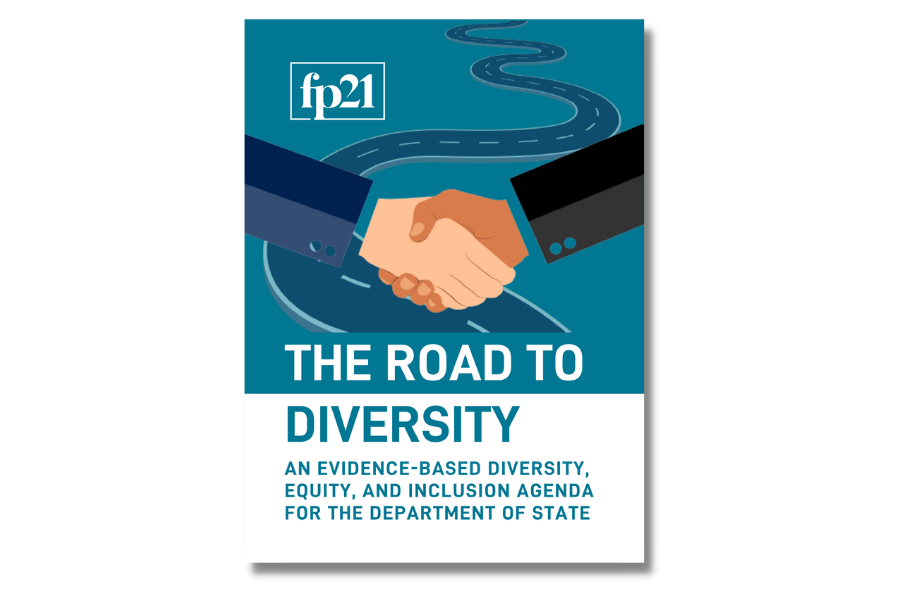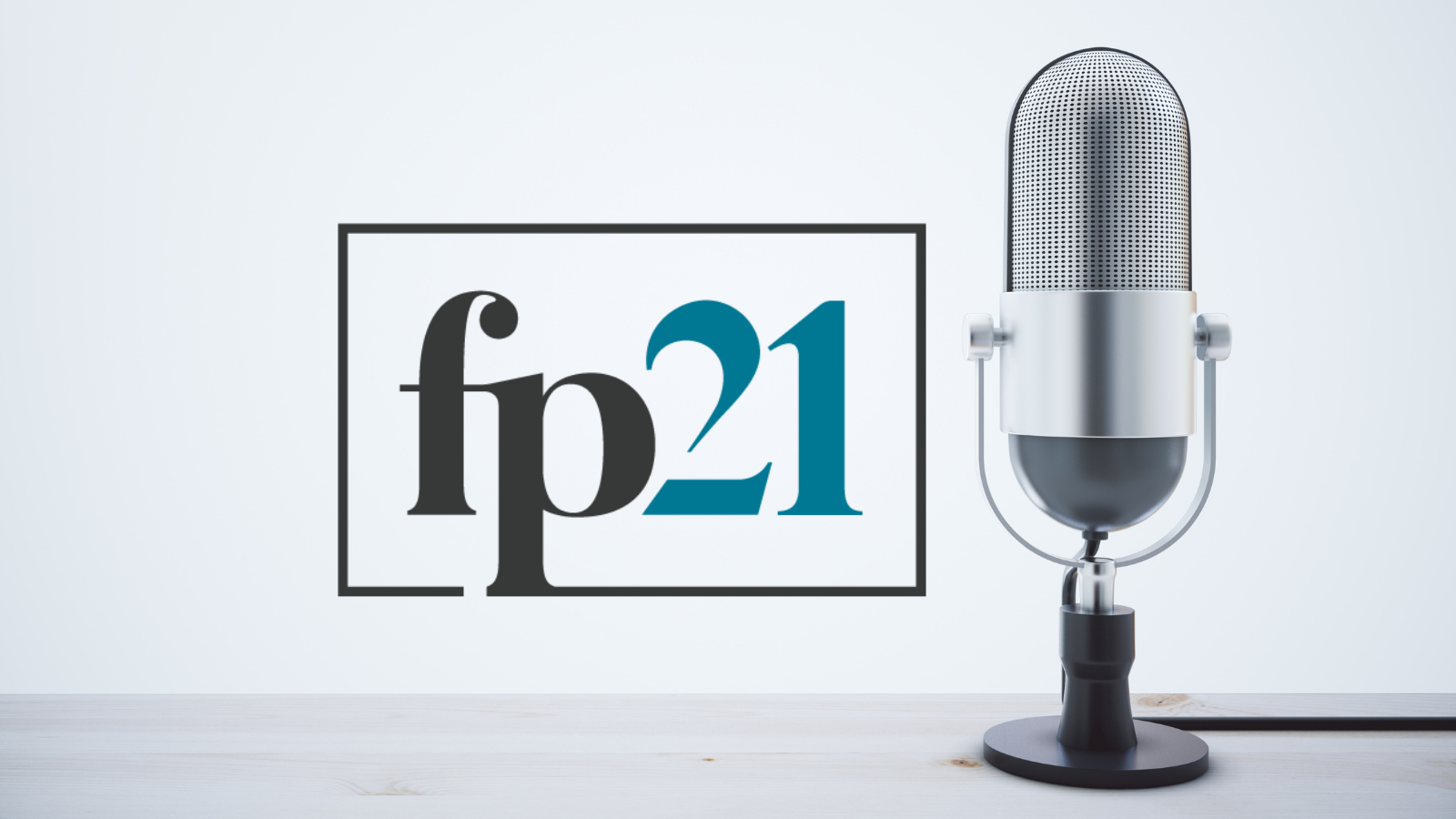Publications
fp21 is building a new culture of foreign policy. Explore our publications below.

State Department Data Requires Oversight to Avoid Digital Anarchy
Dan Spokojny: Rapid progress on data at the State Department is turning up some pain points. Data scientists struggle to access the information they need in a timely fashion. Tangled and outdated legal authorities tie the hands of analysts trying to collaborate. Valuable data sets collected or purchased by one office are not accessible to other offices. And an archaic IT infrastructure held together with duct tape makes diplomacy’s information superhighway feel more like a dirt road. To avoid digital anarchy, Congress should give State’s first-ever Chief Data Officer (CDO) oversight over all of State’s data resources.

The Road to Diversity: An Evidence-Based Diversity, Equity, and Inclusion Agenda for the Department of State
This report deepens our understanding of the research on workplace diversity, equity and inclusion (DEI) initiatives and build a strong foundation of evidence for policymakers to use. We evaluate the most common recommendations to improve DEI based on the best-available evidence in organizations, categorizing each recommendation based on its likelihood of success according to the research.

It’s Official: All Foreign Service Officers Must Learn Data
Dan Spokojny: The State Department will now be evaluating foreign service officers on their proficiency in data collection, analysis, and decision-making following an update to the decision criteria for tenure and promotion. This change to the core precepts reflects the Department’s recognition that data skills are an indispensable part of every leader’s toolkit in today’s information economy.

fp21 Applauds Blinken’s Modernization Steps but Urges Deeper Reforms
Dan Spokojny: Advocates for a strong Department of State should celebrate the Modernizing Diplomacy Initiative. Yet, taken as a whole, the Initiative feels a bit more routine than modern. While everything in the speech was positive – there were at least 21 deliverables organized across five “pillars” for reform – the strategy may not add up to the “historic” change Blinken suggests.

We Are Not Capable of Learning the Lessons of Afghanistan
Dan Spokojny: Lessons are empty wishes without national security institutions capable of actually learning and evolving. Learning, like war, requires an effective strategy and organization to accomplish success. If twenty years of war in Afghanistan have proven anything, it is that our national security institutions have a hard time learning from failure. Yet there is still hope for efforts to draw lessons from Afghanistan. Reformers have an opportunity refocus their attention to improving the processes and institutions of US foreign policy.

State’s New Data Strategy: A (potentially) historic step
Dan Spokojny: The State Department released its first ever Enterprise Data Strategy last week, marking a potentially historic turning point in the conduct of US diplomacy. Deputy Secretary of State Brian McKeon, calls a data-powered world a “paradigm shift” and suggests a “culture change in the Department” will be required. The strategy also suggests that if the United States cannot harness the power of data, we risk getting out-competed by our adversaries.

Upgrading U.S. Public Diplomacy: a behind-the-scenes look at a new model for reform.
What should the future of diplomacy look like? Upgrading U.S. Public Diplomacy: A New Approach for the Age of Memes and Disinformation, published in collaboration with the Atlantic Council, outlines a set of principles and actions to strengthen the State Department’s public diplomacy institutions, domestically and abroad.
This blog post goes behind the scenes of this unique participatory model of research which prioritize consultations staff at every level of the bureaucracy.

Episode 11: The Memo Machine
This week, we are joined by Daniel Balke and Aaron Faust. Both are active founding volunteers of fp21 and have poured gallons of sweat equity into building the intellectual and organizational foundation of our young outfit. Our guests will introduce their background after they do that the conversation touches on the difference between training in foreign policy versus that in the military, possible ways of mobilizing outside expertise the possibility of bringing design thinking into the foreign policymaking process, especially when it comes to the design of decision memos. Finally, both Daniel and Aaron share their views on what constitutes success for fp21.

Press Release: Carnegie Corporation of New York Award Positions fp21 to Advance a New Model for Foreign Policy
fp21's mission to transform U.S. foreign policy received a huge boost: we are so proud to announce that Carnegie Corporation of New York awarded fp21 a grant to fund general operations. This funding marks the first institutional support for fp21, launched as an all-volunteer operation in September 2020. The grant will help us build a more modern and effective U.S. foreign policy driven by evidence and integrity.

Episode 10: Simulating Diplomacy
Alex Bollfrass interviews the Harvard Davis Center's Arvid Bell about creating realistic training environments for foreign policy practitioners. fp21 CEO Dan Spokojny reflects on events in Afghanistan.

Dear Congress: A Big Foreign Affairs Budget Does Not Guarantee Better Diplomacy
Ryan Dukeman and Dan Spokojny: President Biden’s FY22 International Affairs budget proposes the largest increase in non-emergency funding for diplomacy and development in a decade, and some in Congress want to go even bigger. But such investments risk doubling down on existing underperforming organizational structures and processes rather than enabling new ones. What we need now is better diplomacy, not just more.

Episode 9: Not Data Tyrants
The second part of Dr. Thomas Scherer and Dan Spokojny talking about their article, Foreign Policy Should be Evidence-Based.

Episode 8: Deinstitutionalization
Dr. Thomas Scherer and Dan Spokojny discuss their article, Foreign Policy Should be Evidence-Based.

Foreign Policy Should Be Evidence-Based
Dan Spokojny and Thomas Scherer: An ascendant China. A revanchist Russia. Climate change. The threat of nuclear proliferation. Rising authoritarianism. The challenges to U.S. influence on the world stage have become so numerous, serious, and complex that some experts see the “unraveling” of American power. Simply put, yesterday’s tools may not be up to the task of solving today’s problems. We argue that the nation's ability to confront these challenges may depend on adopting an evidence-based policy process.

The Crisis at State is Deeper than We Admit
Dan Spokojny: An eye opening survey conducted by a team of graduate students at Harvard Kennedy School finds that about a third of foreign service officers are planning on quitting the State Department. The report should be commended for bringing renewed attention to the challenges at State, but it risks minimizing the scale of the problem and the transformation needed to save the oldest cabinet agency from further decline. I believe at least three interrelated factors are undermining morale, driving top talent to the private sector, and harming the ability of the State Department to produce exceptional management policy and foreign policy: a top heavy decision-making process that disempowers careerists, diversity challenges that undermine merit, and the questionable impact of the policymaking process.

Episode 7: Train the Bosses
Third and final part of the conversation between Dr. Vic Marsh and fp21 CEO Dan Spokojny.

Episode 6: Training Float
Part 2 of the conversation between Dr. Vic Marsh and fp21 CEO Dan Spokojny.

Episode 5: Phone some Experts
Part I of a conversation between fp21 founder and CEO Dan Spokojny and Victor Marsh, Ph.D.

Episode 4: Culture of Silence
The second part of a conversation between fp21 founder and CEO Dan Spokojny with Maryum Saifee, who is currently a U.S. diplomat contributing in her personal capacity. Her views do not reflect her institutional affiliations. While on a two-year sabbatical from the foreign service, Maryum was a Council on Foreign Relations International Affairs Fellow, Presidential Leadership Scholar, and Truman Center for National Policy Senior Visiting Fellow where she led a 30-person taskforce on State Department reform.

Episode 3: Leave without Pay
How can the State Department benefit from letting its career employees spend time in other institutions?
fp21 founder and CEO Dan Spokojny speaks with Maryum Saifee, who is currently a U.S. diplomat contributing in her personal capacity. Her views do not reflect her institutional affiliations. While on a two-year sabbatical from the foreign service, Maryum was a Council on Foreign Relations International Affairs Fellow, Presidential Leadership Scholar, and Truman Center for National Policy Senior Visiting Fellow where she led a 30-person taskforce on State Department reform.

